#we need answers Bezos
Explore tagged Tumblr posts
Text
Wheel of Time season 2 released OVER A MONTH AGO and I've literally heard nothing about it.
Big yikes. 😬

#i mean season 1 was so bad#no way season two will be any better#also wtf happened to Mat#we need answers Bezos#wheel of time#fantasy#fantasy tv
3 notes
·
View notes
Text
And so it begins…
Tomorrow will see the inauguration of President Trump. And this time around, there’s one crucial difference. His tech bro allies will be front and centre: Musk, Zuckerberg, Bezos. NBC has reported they will be on the platform. This is the image that is going to be seared into our eyeballs and that sets the tone and the expectation for the next four years.
The ascension of the tech gods to the presidential dais is a remarkable journey. Back in December 2016, I watched live on C-Span as Trump welcomed a group of tech execs into a conference room in Trump Tower. Front and centre was Peter Thiel, the founder of Palantir, who’d been one of the few people in Silicon Valley to back Trump. And at that meeting, Trump stroked his hand throughout but the rest of the execs looked nervous, unsure. Some of them such as Sheryl Sandberg had been vocal Democrat supporters. But they all said how excited they were to be there and - Bezos’s word - “super-excited about the possibilities for innovations in this space”.
I just checked to see what I wrote that Sunday. There’s a rule in journalism that if the headline is question, the answer is generally no. But eight years on, it’s now clear: the answer is yes, yes, yes.
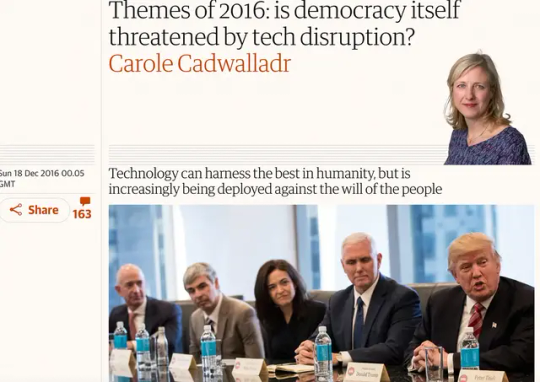
This week Joe Biden’s last major speech sounded the alarm to a middle America which had not heard such words before. America, he said, was becoming a “tech industrial complex”.
“Today, an oligarchy is taking shape in America of extreme wealth, power and influence that really threatens our entire democracy, our basic rights and freedom."
If you’re subscribing to this newsletter none of this is going to be news to you but given reports Google searches for the word “oligarchy” spiked immediately afterwards, it is presumably to a swathe of America that’s never had to reckon with these ideas and issues before.
Sundar Pichai, the chief executive of Google, is also among the execs who are expected to kiss the ring tomorrow. Back in 2016, it was Google that I was focussed on. Google was prompting users to search for results on whether the holocaust really happened and when they did, they were being sent straight to Stormfront, a Nazi website.
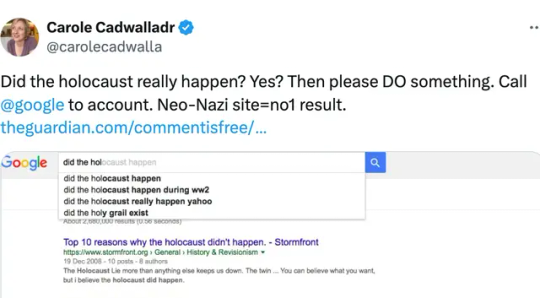
Google responded not by fixing or even acknowledging the problem, instead the head of public affairs for Europe repeatedly rang my editor and complained. Google had recently spent a lot of money with the Guardian on a sponsored virtual reality project and the head of public affairs for the company felt entitled to make his views known. Weeks of low-grade aggression culminated in a nuclear letter that landed on Christmas Eve. I dealt with in a sweat in a service station on the M4 with the Guardian’s head of legal affairs while she prepared her goose for the oven.
I often think about that story, which was the beginning of the trail that took me down the Cambridge Analytica rabbithole and what I learned from it about dealing with big tech. It was the first time I’d been threatened in this way but after the initial fear and panic - the Google exec cc-ed every senior editor on the paper - the Guardian’s managing editor was robust and reassuring: “If there’s anything that needs to be amended, we will amend it,” she said. “And then we will tell him to fuck off.”
70 notes
·
View notes
Text
Michael Tomasky at The New Republic:
I’ve had a lot of conversations since Tuesday revolving around the question of why Donald Trump won. The economy and inflation. Kamala Harris didn’t do this or that. Sexism and racism. The border. That trans-inmate ad that ran a jillion times. And so on. These conversations have usually proceeded along lines where people ask incredulously how a majority of voters could have believed this or that. Weren’t they bothered that Trump is a convicted felon? An adjudicated rapist? Didn’t his invocation of violence against Liz Cheney, or 50 other examples of his disgusting imprecations, obviously disqualify him? And couldn’t they see that Harris, whatever her shortcomings, was a fundamentally smart, honest, well-meaning person who would show basic respect for the Constitution and wouldn’t do anything weird as president?
The answer is obviously no—not enough people were able to see any of those things. At which point people throw up their hands and say, “I give up.” But this line of analysis requires that we ask one more question. And it’s the crucial one: Why didn’t a majority of voters see these things? And understanding the answer to that question is how we start to dig out of this tragic mess.
The answer is the right-wing media. Today, the right-wing media—Fox News (and the entire News Corp.), Newsmax, One America News Network, the Sinclair network of radio and TV stations and newspapers, iHeart Media (formerly Clear Channel), the Bott Radio Network (Christian radio), Elon Musk’s X, the huge podcasts like Joe Rogan’s, and much more—sets the news agenda in this country. And they fed their audiences a diet of slanted and distorted information that made it possible for Trump to win. Let me say that again, in case it got lost: Today, the right-wing media sets the news agenda in this country. Not The New York Times. Not The Washington Post (which bent over backwards to exert no influence when Jeff Bezos pulled the paper’s Harris endorsement). Not CBS, NBC, and ABC. The agenda is set by all the outlets I listed in the above paragraph. Even the mighty New York Times follows in its wake, aping the tone they set disturbingly often. If you read me regularly, you know that I’ve written this before, but I’m going to keep writing it until people—specifically, rich liberals, who are the only people in the world who have the power to do something about this state of affairs—take some action.
[...]
This is the year in which it became obvious that the right-wing media has more power than the mainstream media. It’s not just that it’s bigger. It’s that it speaks with one voice, and that voice says Democrats and liberals are treasonous elitists who hate you, and Republicans and conservatives love God and country and are your last line of defense against your son coming home from school your daughter. And that is why Donald Trump won. Indeed, the right-wing media is why he exists in our political lives in the first place. Don’t believe me? Try this thought experiment. Imagine Trump coming down that escalator in 2015 with no right-wing media; no Fox News; an agenda still set, and mores still established, by staid old CBS News, the House of Murrow, and The New York Times.
That atmosphere would have denied an outrageous figure like Trump the oxygen he needed to survive and flourish. He just would not have been taken seriously at all. In that world, ruled by a traditional mainstream media, Trump would have been seen by Republicans as a liability, and they would have done what they failed to do in real life—banded together to marginalize him. But the existence of Fox changed everything. Fox hosted the early debates, which Trump won not with intelligence, but outrageousness. He tapped into the grievance culture Fox had nursed among conservatives for years. He had (most of the time) Rupert Murdoch’s personal blessing. In 2015-16, Fox made Trump possible. [...]
The fake story about Haitian residents of Springfield, Ohio eating cats and dogs, for example, started with a Facebook post citing second- and third-hand sources, Gertz told me; it then “circulated on X and was picked up by all the major right-wing influencers.” Only then did Vance, a very online dude, notice it and decide to run with it. And then Trump said it himself at the debate. But it started in the right-wing media. Likewise with the post-debate ABC “whistleblower” claims, which Gertz wrote about at the time. This was the story that ABC, which hosted the only presidential debate this election, fed Team Harris the questions in advance. This started, Gertz wrote, as a “wildly flimsy internet rumor launched by a random pro-Trump X poster.” Soon enough, the right-wing media was all over it.
Maybe that one didn’t make a huge difference (although who knows?), but this one, I believe, absolutely did: the idea that Harris and Joe Biden swiped emergency aid away from the victims of Hurricane Helene (in mostly Southern, red states) and gave it all to undocumented migrants. It did not start with Trump or his campaign or Vance or the Republican National Committee or Lindsey Graham. It started on Fox. Only then did the others pick it up. And it was key, since this was a moment when Harris’s momentum in the polling averages began to flag.
[...]
To much of America, by the way, this is not understood as one side’s view of things. It’s simply “the news.” This is what people—white people, chiefly—watch in about two-thirds of the country. I trust that you’ve seen in your travels, as I have in mine, that in red or even some purple parts of the country, when you walk into a hotel lobby or a hospital waiting room or even a bar, where the TVs ought to be offering us some peace and just showing ESPN, at least one television is tuned to Fox. That’s reach, and that’s power. And then people get in their cars to drive home and listen to an iHeart, right-wing talk radio station. And then they get home and watch their local news and it’s owned by Sinclair, and it, too, has a clear right-wing slant. And then they pick up their local paper, if it still exists, and the oped page features Cal Thomas and Ben Shapiro. Liberals, rich and otherwise, live in a bubble where they never see this stuff. I would beg them to see it. Watch some Fox. Listen to some Christian radio. Experience the news that millions of Americans are getting on a daily basis. You’ll pretty quickly come to understand what I’m saying here.
[...] The reason? The right-wing media. And it’s only growing and growing. And I haven’t even gotten to social media and Tik Tok and the other platforms from which far more people are getting their news these days. The right is way ahead on those fronts too. Liberals must wake up and understand this and do something about it before it’s too late, which it almost is.
Michael Tomasky of TNR explains it perfectly: Donald Trump won due to the right-wing media apparatus feeding lies to the voters.
#Donald Trump#Conservative Media Apparatus#2024 Presidential Election#2024 Elections#Broadcast News Media#Hurricane Helene#Hurricane Helene Conspiracies#Springfield Cat Eating Hoax
59 notes
·
View notes
Note
I wanna start off by saying that I agree with the fans who say that the rep of trans women and transmisogyny affected comedians on dropout isn't enough (because it is orders of magnitude less than the rep of cis people and less than 1/10 the rep of transmisogyny excluded trans comedians iirc).
But I have to disagree with some folks I see calling Sam and Brennan greedy rich assholes as an explanation for why they don't wanna platform transfemmes. Because when we talk about class, it's very important to separate specific levels of "rich" between comfortable and ultra wealthy.
Robert Reich of all politicians is not going to hoard wealth, but he probably did make Sam's life growing up more comfortable than most people and gave him some financial grace to pursue comedy. But Dropout as it used to be was bleeding money in 2020. They have less than a million paid subscribers, and they share profits with the cast AND they're paying the wages of the crew. However much money Sam and Brennan are making, it is nothing compared to a billion dollars. It's not clear how much they make, but say Sam is worth $50 million (a high random number that I think is still way too high for what he'd have). That's still only 5% of $1 billion. We are all closer to Sam's level of wealth than he is to, say, Jeff Bezos. Any kids he and his wife may have are going to have a comfortable life, and he is probably going to have a good retirement, but I think you still have to look at the scale of things. And Brennan is likely making less than Sam while still being financially stable, but he clearly knows what it's like to be broke and starving and is still heavily affected by that past to this day.
Is it possible that Sam and the folks in charge of hiring casting at Dropout think TMA folks are less likely to bring profit and that's why they don't hire them? I don't know. I'm not psychic. But the image of them some people push in regards to their class is straight up wrong.
DEFINITELY more TMA comedians besides Persephone (I love her and I would actually want to see more of her in addition to other new cast members) should be hired as cast for Dropout shows in general. I think Sam should/could also pass off hosting duties of Game Changer at the very least and possibly Make Some Noise, too, bc the amount of cis men representation from him and Brennan alone in comparison to any trans people but especially TMA people is insane. They're always going to have the seasons they ran, and they can still be cast once in a while.
But I really think this lack of representation started as a blind spot rather than evil intent to squeeze as much profit out of Dropout as possible the way some people think it is. If it continues after all this conversation about it (they film like a year in advance, so maybe some grace can be given), yeah, I'm going to be upset. I already canceled my subscription, though, tbh just because the statistics of rep in terms of cis men/women and transmascs/transfemmes is extremely disproportionate for the kind of work they do.
I haven't personally seen people make it a "greedy white cis men" thing, but yk, I'm not omniscient, could be a part of tumblr doing that. I personally don't think it's an intentional thing, that's the vicious part of normalized bigotry/lack of diversity, you don't notice it until you do.
I will say though, I don't think Sam needs to stop hosting either Game Changer or Make Some Noise, he's addressed them being his dream projects and like, a love letter to game shows, I don't think either would be as good without him.
But like, they're creating a lot of new shows, there's clearly space for new regulars on Dropout. There's space for us to be included, just gotta wait for them to answer our ask for an invite and all that.
#ask#dropout#dropout tv#sam reich#robert reich#brenda lee mulligan#college humor#persephone valentine#game changer#make some noise
39 notes
·
View notes
Text
The super-rich got that way through monopolies
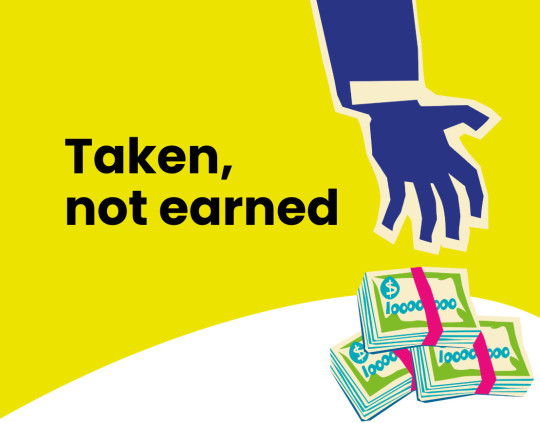
Catch me in Miami! I'll be at Books and Books in Coral Gables on Jan 22 at 8PM.

Just in time for Davos, here's 'Taken, not earned: How monopolists drive the world’s power and wealth divide," a report from a coalition of international tax justice and anti-corporate activist groups:
https://www.balancedeconomy.net/wp-content/uploads/2024/01/Davos-Taken-not-Earned-full-Report-2024-FINAL.pdf
The rise of monopolies over the past 40 years came about as the result of specific, deliberate policy choices. As the report documents, the wealthiest people in America funneled a fortune into neutering antitrust enforcement, through the "consumer welfare" doctrine.
This is an economic theory that equates monopolies with efficiency: "If everyone is buying the same things from the same store, that tells you the store is doing something right, not something criminal." 40 years ago, and ever since, the wealthy have funded think-tanks, university programs and even "continuing education" programs for federal judges to push this line:
https://pluralistic.net/2021/08/13/post-bork-era/#manne-down
They didn't do this for ideological reasons – they were chasing material goals. Monopolies produce vast profits, and those profits produce vast wealth. The rise and rise of the super rich cannot be decoupled from the rise and rise of monopolies.
If you're new to this, you might think that "monopoly" only refers to a sector in which there is only one seller. But that's not what economists mean when they talk about monopolies and monopolization: for them, a monopoly is a company with power. Economists who talk about monopolies mean companies that "can act independently without needing to consider the responses of competitors, customers, workers, or even governments."
One way to measure that power is through markups ("the difference between the selling price of goods or services and their cost"). Very large companies in concentrated industries have very high markups, and they're getting higher. From 2017-22, the 20 largest companies in the world had average markups of 50%. The 100 largest companies average 43%. The smallest half of companies get average markups of 25%.
Those markups rose steeply during the covid lockdowns – and so did the wealth of the billionaires who own them. Tech billionaires – Bezos, Brin and Page, Gates and Ballmer – all made their fortunes from monopolies. Warren Buffet is a proud monopolist who says "the single most important decision in evaluating a business is pricing power�� if you have to have a prayer session before raising the price by 10 percent, then you’ve got a terrible business."
We are living in the age of the monopoly. In the 1930s, the top 0.1% of US companies accounted for less than half of America's GDP. Today, it's 90%. And it's accelerating, with global mergers climbing from 2,676 in 1985 to 62,000 in 2021.
Monopoly's cheerleaders claim that these numbers vindicate them. Monopolies are so efficient that everyone wants to create them. Those efficiencies can be seen in the markups monopolies can charge, and the profits they can make. If a monopoly has a 50% markup, that's just the "efficiency of scale."
But what is the actual shape of this "efficiency?" How is it manifest? The report's authors answer this with one word: power.
Monopolists have the power "to extract wealth from, to restrict the freedoms of, and to manipulate or steer the vastly larger numbers of losers." They establish themselves as gatekeepers and create chokepoints that they can use to raise prices paid by their customers and lower the payout to their suppliers:
https://chokepointcapitalism.com/
These chokepoints let monopolies usurp "one of the ultimate prerogatives of state power: taxation." Amazon sellers pay a 51% tax to sell on the platform. App Store suppliers pay a 30% tax on every dollar they make with their apps. That translates into higher costs. Consider a good that costs $10 to make: the bottom 50% of companies (by size) would charge $12.50 for that product on average. The largest companies would charge $15. Thus monopolies don't just make their owners richer – they make everyone else poorer, too.
This power to set prices is behind the greedflation (or, more politely, "seller's inflation"). The CEOs of the largest companies in the world keep getting on investor calls and bragging about this:
https://pluralistic.net/2023/03/11/price-over-volume/#pepsi-pricing-power
The food system is incredibly monopolistic. The Cargill family own the largest commodity trader in the world, which is how they built up a family fortune worth $43b. Cargill is one of the "ABCD" companies ("Archer Daniels Midland, Bunge, Cargill and Louis Dreyfus") that control the world's food supply, and they tripled their profits during the lockdown.
Monopolies gouge everyone – even governments. Pfizer charged the NHS £18-22/shot for vaccines that cost £5/shot to make. They took the British government for £2bn – that's enough to pay last year's pay hike for NHS nurses, six times over,
But monopolies also abuse their suppliers, especially their employees. All over the world, competition authorities are uncovering "wage fixing" and "no poaching" agreements among large firms, who collude to put a cap on what workers in their sector can earn. Unions report workers having their pay determined by algorithms. Bosses lock employees in with noncompetes and huge repayment bills for "training":
https://pluralistic.net/2022/08/04/its-a-trap/#a-little-on-the-nose
Monopolies corrupt our governments. Companies with huge markups can spend some of that money on lobbying. The 20 largest companies in the world spend more than €155m/year lobbying in the US and alone, not counting the money they spend on industry associations and other cutouts that lobby on their behalf. Big Tech leads the pack on lobbying, accounting for 82% of EU lobbying spending and 58% of US lobbying.
One key monopoly lobbying priority is blocking climate action, from Apple lobbying against right-to-repair, which creates vast mountains of e-waste, to energy monopolist lobbying against renewables. And energy companies are getting more monopolistic, with Exxonmobil spending $65b to buy Pioneer and Chevron spending $60b to buy Hess. Many of the world's richest people are fossil fuel monopolists, like Charles and Julia Koch, the 18th and 19th richest people on the Forbes list. They spend fortunes on climate denial.
When people talk about the climate impact of billionaires, they tend to focus on the carbon footprints of their mansions and private jets, but the true environmental cost of the ultra rich comes from the anti-renewables, pro-emissions lobbying they buy with their monopoly winnings.
The good news is that the tide is turning on monopolies. A coalition of "businesses, workers, farmers, consumers and other civil society groups" have created a "remarkably successful anti-monopoly movement." The past three years saw more regulatory action on corporate mergers, price-gouging, predatory pricing, labor abuses and other evils of monopoly than we got in the past 40 years.
The business press – cheerleaders for monopoly – keep running editorials claiming that enforcers like Lina Khan are getting nothing done. Sure, WSJ, Khan's getting nothing done – that's why you ran 80 editorial about her:
https://pluralistic.net/2023/07/14/making-good-trouble/#the-peoples-champion
(Khan's winning like crazy. Just last month she killed four megamergers:)
https://www.thesling.org/the-ftc-just-blocked-four-mergers-in-a-month-heres-how-its-latest-win-fits-into-the-broader-campaign-to-revive-antitrust/
The EU and UK are taking actions that would have been unimaginable just a few years ago. Canada is finally set to get a real competition law, with the Trudeau government promising to add an "abuse of dominance" rule to Canada's antitrust system.
Even more exciting are the moves in the global south. In South Africa, "competition law contains some of the most progressive ideas of all":
It actively seeks to create greater economic participation, particularly for ‘historically disadvantaged persons’ as part of its public interest considerations in merger decisions.
Balzac wrote, "Behind every great fortune there is a crime." Chances are, the rapsheet includes an antitrust violation. Getting rid of monopolies won't get rid of all the billionaires, but it'll certainly get rid of a hell of a lot of them.
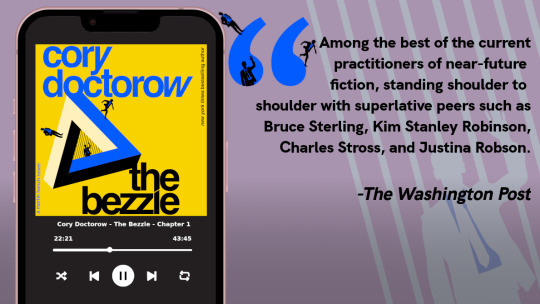
I'm Kickstarting the audiobook for The Bezzle, the sequel to Red Team Blues, narrated by @wilwheaton! You can pre-order the audiobook and ebook, DRM free, as well as the hardcover, signed or unsigned. There's also bundles with Red Team Blues in ebook, audio or paperback.

If you'd like an essay-formatted version of this post to read or share, here's a link to it on pluralistic.net, my surveillance-free, ad-free, tracker-free blog:
https://pluralistic.net/2024/01/17/monopolies-produce-billionaires/#inequality-corruption-climate-poverty-sweatshops
#billionaires#wef#climate#monopoly#world economic forum#competition#antitrust#consumer welfare#inequality#corruption#davos#guillotine watch
220 notes
·
View notes
Text
Even More Shit I've Read in Runescape Chat Starters
edited for clarity
"Keep talking like that and I'll be forced to kiss you."
"I'd rather have sex with a Digimon than a Pokemon, just saying."
"We get it. You're a rich, entitled asshole. Boo hoo."
"Nepotism is always the answer."
"Joke's on you, I slept with my teacher."
"What's harder, an 11th grade math test or clipping a big dog's nails?"
"100% of divorces start with marriage, just saying."
"Why the fuck does unsweet tea exist upon us?"
"Just sit there and smoke a couple joints."
"You speak in snake tongue."
"I'd pour ketchup on you."
"No, not my flour! I need that for baking!"
"I would fuck everything that moves on sight after an apocalypse."
"Only psychopaths say happy Monday."
"Can someone let me kill 'em in the fight pit?"
"If a blind person goes on vacation, do they still go sightseeing?"
"Ew. Why would I want to grow?"
"I call everyone dude, but even that is touchy now."
"I'm not a human and you offend me."
"We have to do a recount. Get to the ballots, Jimmy."
"Would you be interested in our exciting adventures?"
"Does rubbing your tummy help digestion?"
"You have to squat, then cough."
"The Conjuring, Chucky, and Annabelle scared me away from dolls."
"I'm coming for your property."
"Sorry I logged in and took up all y'all's bandwidth."
"I am here to play in the dirt and kick ass. And I'm all out of ass."
"Are we not all sad and lonely?"
"Tell that motherfucker to get some antihistamines."
"Text Bezos. Maybe he can get you one."
#roleplay meme#rp meme#sentence meme#sentence starters#roleplay starters#rp starters#[ meme ]#[ quote ]#[ rune ]
7 notes
·
View notes
Text





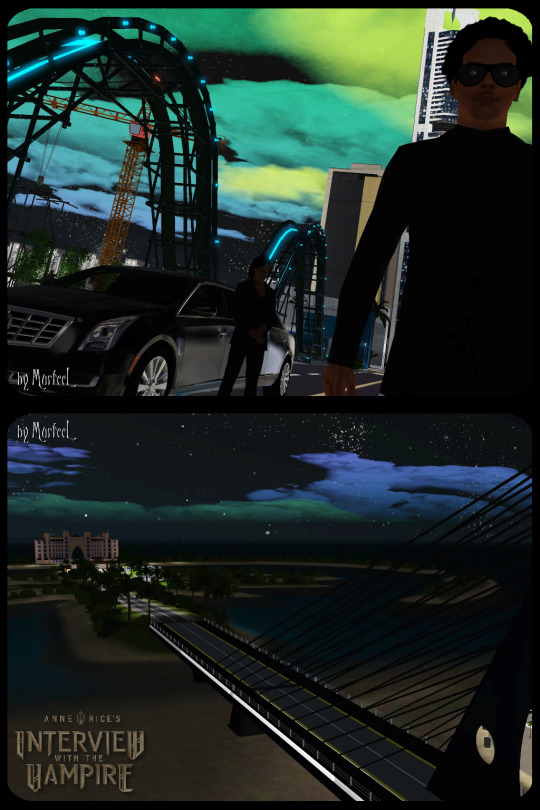








IWTV 2022 INSP - The Most Dangerous Man in the World
Daniel: I told my editor I was meeting with the most dangerous man in the world. Gave him two choices. He came back with Bezos and Putin! Louis: I wasn't sure you'd remembered me. Your book makes no mention of our prior meeting. Daniel: Gritty memoir, drugs, humiliation, self-pity kind of thing. Mention vampires in one of those, readers tend to call bulls***. You've got your own hangar at the airport, privileges on the Royal Meydan Bridge, and zero presence online. I know the Emirates are big on privacy, and that's probably important to you, but I gotta ask: what does it cost, this haven't-aged-in-half-a-century, killer views in all directions anonymity? Louis: Quite a lot. I have to be very careful whom I let in. Daniel: Yeah, well, things didn't end well the last time, so forgive me if I'm a little nervous! Louis: Back in San Francisco, you said, and I paraphrase, "Give it to me. Make me a vampire now." Daniel: In the eyes of a 20-year-old, you were wasting the gift. Louis: You're in your 20s, Rashid. What do you think? Rashid: Well, Mr. du Lac presides in the most desired real estate in the country. I do not see the "waste" Mr. Molloy sees. Daniel: Yeah, well, he lived in a dump the last time we did this. Louis: I'd give it to you now.
– Interview with the Vampire, S01E01, S01E06
MY THOUGHTS & CC CREDITS
MY THOUGHTS
My contribution to @iwtvfanevents' Vampterview rewatch of IWTV Season 1! \(^0^)/ I basically rebuilt Loumand's Dubai Penthouse from scratch, cuz in my other post it was on the same lot as Loustat's 1132 townhouse. 🤭 And I decided to remake my Daniel & Rashid/Armand sims, cuz I was too lazy to crack open my old saves and save a copy of them to my bin. So...yeah, "a do-over," in Daniel's words. XD
I just love thinking about Louis' strange life as a billionaire mogul, and how AMC's nodding to the life he had with Armand in Miami & NYC in the books, and the life he now has with "Rashid" in Dubai. I have many suspicions about what went down to bring Loumand to Dubai, and where in the books' timeline we even are. I need answers, Rolin!!!!
CC CREDITS
Dubai world; Zen Tower at Youtube (I just gutted the interior)
Limo by FreshPrince
Helicopter by @dailycard
IWTV Books & Rollercoaster "bridge" w/ Fullbright in beta by me
23 notes
·
View notes
Text
Why do people accept information uncritically?
I do believe it's their education- not only in priming them to be receptive to any perceived authority without interrogation but especially to gravitate toward whatever information gratifies a specific emotional and cognitive bias.
All education has this basic shape because the child's national culture reflects and is given contour by what the child will be taught. School is socialization first
hence why there's an obvious correspondence between academic success and respect for authority in the main.
There is no paucity of inspired rebels
but really, most people in a position of authority are masterful obedience school graduates.
Society chooses to reward this behavior with a mechanical system that seeks to reduce knowledge to an absolute Platonic Truth- questions come with right answers and the questions are right because the people who give out jobs and manufacture the answers say they are.
And the value of these questions and answers comes with a measurable price tag of a salary instead of any import to the world or even the self.
And this is a serious problem. Because respect for education is in justifiable implosion in this country.
Look what it manufactures.
I excelled academically and was persecuted and brutalized for it because
well
I was weird. I was trans and insane and the victim of things people refused to believe so I manufactured an entire delusional universe in my head instead and people believed that
so it stayed for far too long.
But a functioning psychotic negotiated that system with straight 4.0s, APs, dual enrollment
all without even thinking. It was ritualism- I knew how to fill in the answers because I was intellectually curious but if I hadn't loved books so much I would've been a dropout.
The people it produces are failures
the people it disappoints are failures
education is a failure. A society's government is a reflection of its people: Either its willingness to tolerate out of laziness and fear or its resolution always toward betterment.
Well we can see what kind of society we have.
Form
over
meaning.
So long as we vote, the whole Democratic Party lies down as if there isn't reason for the military to get involved not as a coup but as a countercoup. But no.
Because your stupidity is more important than the integrity of the country.
Your stupidity makes this system possible.
I'm stupid, too. My god- the things I didn't get to develop. The lies and decisions made without any presence of mind I see now in the third-person and scream and the cumulative horrorshow of my neverending insanity.
So why do people believe what they read on the internet?
Because it has the same shape as what's peddled as knowledge.
It touches cognitive bias made at formative age and never contradicted because education invariably dictates economic circumstance and access to education even in this compromised basal state is decided by what?
Closed cycles of intellectual and economic poverty widen by demography inevitability as capitalism just consolidates the idea of wealth in smaller and denser glaciers.
But their numbers are larger.
There was no plan in this country.
To believe in a conspiracy is magical thinking. No one started this with any specific intent to make Americans stupid.
On some level, oil company executives aren't caricatures: They're not really trying to burn the world whole
it's just their product does it and their education has taught them injustice is all right as long as a dollar comes from it.
Jeff Bezos probably doesn't salivate over how much he abuses his workforce. He just does it anyway because it's acceptable.
So does everything else to most everyone else.
So why do they believe what they read on the internet, even if it has a performative common language and form with what's ostensibly rebellious? Because they have a need for a specific emotional bias turned by circumstance but intellectually the same.
Conservatives tend to be angrier
they're dumber.
Anger makes people stupid.
I'm angry a lot. I'm a fucking moron in that state but it's my periods of tranquil lucidity I apply to productive ends.
But their anger doesn't get to stop.
Even here, if you're curious, watch the arc of angry people- socially more self-limiting, intellectually even more biased, and emotionally spiraling toward extremes.
Some of them clearly excel at the pretentious form of academics but they don't really have the ability to think past facile nostra that have no connection to reality
and that's much more MAGA than we give them credit for.
It's time to start treating knowledge without any bias, accessible to all thinking, as the cornerstone of a new social culture.
I don't mean an anything-goes libertarian society- I mean a sincere openness to interrogation of everything, every value, every ideal, every stricture because hollow ritualism has brought us to this point.
It could have gone any way
it still could.
At this point, Donald Trump could have a stroke and we might get socialized medicine out of it because he'll suddenly start speaking in Progressive glossolalia.
But it's unlikely.
We need to question how valuable our education even is when it produces this kind of authority.
And we especially need to question each other.
Social pressure can't substitute for thought anymore.
Nothing can.
What's interesting is that when you delve into a field and you develop a comparative and interdisciplinary familiarity with a subject, you're much more receptive to questions.
Self-doubt is something people close to the margins can't afford. It's the product of comfort.
We need people to be comfortable with knowledge again. I don't believe anyone is born stupid. That is a constructed atrophy.
We need an open society again
one that values wisdom and progress and it's really very simple.
We just have to show it and teach our children. It won't happen on the internet.
You don't really need a violence-in-the-street kind of revolution. Most changes that look like cataclysm in retrospect passed unmarked but certainly noticed by most people.
Just be good.
Think.
Accept that the discussion of ideas isn't a form of violence- that to ask a question isn't to insult or demean but seek another's perspective and maybe have an earnest exchange of understandings on the subject. Quite possibly a new better synthesis can form without the belief in a zero-sum economics of knowledge as owned and politically possessed and ideas as changeless ideals out of pride or personal attachment.
It isn't a novel idea. It's Socraticism. That's galaxies better than the vapid march of Prussian education.
It's more labor-intensive but so what? Education doesn't need to water itself down to expand; it needs to be exalted as a vital field.
Fire all the teachers in America right now.
I mean all of them, pre-K through postdoctoral fellows.
They need to be retrained
society needs to be replumbed.
Their talents won't disappear: Their passions need to be given worthy application.
Ours do.
The smarter people are, the more civil they are, also. Society just will be comfortable. It will be better.
People won't just believe whatever.
And there will be no place for oil executives.
3 notes
·
View notes
Note
I'm not very comfortable with violent revolution because, while it does work (we have historical proof of this), I have no indication that any of these "violence is the only answer!" people I've seen are anything but bullies and fools.
I strongly suspect that if they got their bloodshed, a great number of minorities would suffer because he said that she said that so and so was buddies with whatsisname, so lets drag him into the street and beat him to death! and no one would bother to check until afterwards if any of it was actually true. So the mob would be weaponized against whichever minority is easiest to believe that kind of lie about, and against individuals who just aren't very well liked.
And a lot of these revolutionmongers honestly read like the kind of people who are just looking for an excuse to get violent. They'd torch your dumpy apartment just as soon as Bezo's third mansion, and they go right to war in the streets before even bothering with more practical things like forming unions or volunteering at a homeless shelter.
Every one of them has read to me like the "We should bring back bullying" crowd or the aphobic idiots or the fandom antis; they're upset that harassing neurodivergent and queer people on social media isn't enough, and they want to hurt people IRL, too. They just need an acceptable target.
--
49 notes
·
View notes
Text
A City on Mars
It's really good!
"A City on Mars" is the newest popular science book by Kelly and Zach Weinersmith (@zachweinersmith). Besides their popular science books, they're mostly known for @smbc-comics (like xkcd but sometimes meaner and in color). This book deals with the question of space settlement: Where can we settle in space, how would we settle in space, which questions are still unanswered, and is this even a good idea? They review all the applicable research to come up with answers.
Interestingly, the answer to the question "is this a good idea?" turns out to be no, even to the author's surprise. As a result, they expect that the space settlement community, who helped a lot with creating the book, will absolutely hate it. My guess is that here on Tumblr, the conclusion "we shouldn't let Elon Musk and Jeff Bezos use their incredible wealth to build weird semi-independent company-controlled colonies on foreign planets" will prove to be rather popular. I think they make good arguments for their point of view. They conclude that if we want to do space settlement, the best solution is to "wait and go big". That means first do a lot of research, maybe with some temporary research outposts, and only then start with a long-term settlement once we worked out most of the kinks. And that first settlement should be very big, at least in the thousands of people, from basically the start, because anything less than that will cause way too many problems.
The book itself is really well written, full of fun anecdotes and drawings, and it makes all of its topics accessible without ever feel like it's talking down to people. It's funny, informative and well researched. If I have any criticism, it's that I almost wish it was twice as long. Its goal is to provide an overview into a field that is incredibly broad, reaching from physics, geophysics and biology all the way to international law and philosophical questions about property rights, and it does an admirable job with all of them. But the book can't go into too much depth on any of these issues, and some (like how an economy on such a settlement would be set up) needed to be skipped entirely. There's more than enough material here to write at least two to three more books like this, and I would absolutely love to read them if they ever happen.
But really, this book is great. I intended to only look into the first chapter yesterday, and accidentally ended up reading through all of it. Very much recommended.
#a city on mars#space exploration#space settlement#this has nothing to do with the rocket test yesterday the book just happened to arrive on the same day for me
11 notes
·
View notes
Text
Posting meme- CHRISJEN AVASARALA !!!!!!!!! (from runawaynun)
CHRISJEN AVASARALA !!!!!!!!! (from runawaynun)
Runawaynun your Expanse vids are amazing, everyone needs to watch them!!
Okay I fucking LOVE Chrisjen Avasarala. I love her in the show, I love her in the books. I fucking love where she starts at the beginning of the series and where she ends up—both in the show, and in the books Shohreh portrayed her beyond perfection. Her leadership style makes my eyes pop and I just love how she commands a room and is trying her fucking best despite all the shit happening. Her wardrobe. Her attitude. HER EVERYTHING. *flails a lot*
I watched season 1 of The Expanse and enjoyed it enough to want to read the first book after I finished the season. Just to hold me over until the second season. Well…I read the first book and then gobbled up the second book Caliban’s War. I lost my utter fucking mind when Chrisjen met Bobbie and then spent the rest of the hiatus waiting and salivating for Bobbie and Chrisjen scenes. THEY WERE MAGNIFICENT. Season 2 was incredible. 10/10 amazing stuff.
One thing that was readily notable after I read the first three books and continued to wait for the show to return, is how much cursing they wrote out of her dialogue in season 1. There was a noticeable uptick in her salty language once the show moved to Amazon and for that I am grateful (but still fuck Jeff Bezos, and I know the irony wasn’t lost on the authors that a real-life inspiration for Jules-Pierre Mao saved their show).
Anyway, I love the series but also the trilogies have some AMAZING QUOTES. Here are a few that I’ll share from the books. ItReachesOut compiled most of these on motivational posters which is linked below.
“My life has become a single, ongoing revelation that I haven’t been cynical enough.” ― Chrisjen Avasarala, Babylon's Ashes
“…and a familiar voice was coming from the terminal, "Going to be monitoring anything we fucking say. If you wanted to discuss menstruation at great length and detail, this is probably our best chance. He's always been squeamish about women. And no one likes a Peeping Tom, even if he is Prime Minister.” ― Chrisjen Avasarala, Nemesis Games
“It'd be a better world if there was always at least one right answer instead of a basket of fucked.” ― Chrisjen Avasarala
Realizing you've got shit on your fingers is the first step to washing your hands. -Chrisjen Avasarala
Always good to have a penis in uniform in the room. -Chrisjen Avasarala
I don't give a fuck whose birthday it is, you make this happen before my meeting is over or I'll have your nuts as paperweights. -Chrisjen Avasarala
I have crates of anti-herpes drugs that are more legitimate than you are. -Chrisjen Avasarala
I don't mean that they all fuck men. I mean they're all men, the fuckers. -Chrisjen Avasarala
That man's asshole must be tight enough right now to bend space. -Chrisjen Avasarala
Try not to put your dick in this. It's fucked enough already. -Chrisjen Avasarala
runawaynun's AMAZING EXPANSE VIDS:
Sexy Back (Chrisjen) THIS COVER is fucking brilliant.
Solid (Bobbie/Chrisjen) THEM!! god I love Bobbie.
Poor Atlas (Chrisjen) the lyrics and tone of this song is so devastatingly perfect omg
Thes are all STUNNING incredible amazing frothingly good Expanse vids with Chrisjen! runawaynun also has some delicious-looking femslash fic I have not dove into yet cause I haven't really had the brain to read Expanse fic but OH MY GODDDD. I love Chrisjen Avasarala.
#december posting meme#the expanse#chrisjen avasarala#the expanse books#kuwdora recs#vid rec#my posts#textpost#queuedora
46 notes
·
View notes
Note
List 5 things that make you happy, then put this in the askbox for the last 10 people who reblogged something from you! get to know your mutuals and followers <3
Hi Zia!! Thank you so much for the ask, I'm really excited to share my answers here! It was real hard to pick, but I had fun!!
5 - My girlfriend!! We met on tumblr years ago when I was looking for an artist to commission, and found out she lived real close by! We became friends, and then it all just kinda snowballed from there really. We really enjoy each other's company, and usually call once a day at night before bed to spend a little time together! She means a lot to me, and I'm really happy to have met her! I really love her, she means the world to me, and I always do my best to make sure she knows that. y'know what she's asleep right now but I'm gonna message her and tell her how much she means to me thank you for making me think about her
4 - My family! My sister especially; we're very close, and love to do pretty much everything together. I usually watch her play games on some of her consoles, maybe we'll watch shows together, all kinds of stuff. She's always been there for me and helped me be the person I am today, so I really appreciate her and all she's done for me! This also includes my cats. Me and my sister jointly own three cats; Quinn, the oldest (and my profile picture), Binky (looks just like Quinn but smaller), and Leon (typical white and orange cat). They all mean a lot to me! I try not to take their companionship for granted, even if they wake me up at all hours of the night lol
3 - Space & space exploration! Really, mostly just in our own solar system. And for the exploration part, just stuff from the 70s-80s and concepts from then. I really love the optimism of the 70s, and all they had thought we would achieve by now. And honestly, a lot of concepts developed around that time still hold up to this day; O'Neill cylinders, space-based solar power, maglev-based launchers, stuff like that! I really hope someday we can get rid of these capitalist chains and focus on making the world and universe a brighter place. I'm a firm believer that we're here to spread the gift of life as far as possible, allowing for as many beings as possible to enjoy the experience of… well, being. Life is very precious, and I fully believe that the exploitation and development of space is something we need to do in order to help bring the gift of life to as many worlds as possible. That being said, I hate Elon Musk, Jeff Bezos, and every single astrocapitalist asshole who dreams of turning the stars into nothing but lifeless ash with a burning passion. I hope they all choke. Also, my favorite objects in our solar system are Uranus and her moons, and Venus lol
2 - Music! I know it gets said a lot, but music is a very important thing for me. I don't listen as much as I used to, but I still try to as much as I can. I usually listen to stuff only from the 1960s-1990s, but I do branch out every now and again! I really love folk music from the earlier part of that time frame, with musicians like Norma Tanega, Emitt Rhodes, Jim Sullivan, and more taking up a large amount of my favorites there. I also really like international music, especially Soviet stuff! It's so interesting to hear the different melodies and instruments, as well as singing styles. It's such a neat crossroad of cultures, there was so much interesting & beautiful sounding stuff! It's a shame that it's largely ignored over here in the west.
Also, I'm currently on a big Telex kick right now, though! They were a Belgian band from the late 70s into the 80s, and made music that was synthesizer only. I've liked them for quite some time, but it's just kinda coming back full force right now! On top of that, I will admit... Sometimes autism gets the better of me and I can and will listen to a song dozens of time in a row lol.
1 - My book series I'm writing and developing! I really don't like to talk about it (shy + nervous), but it means a lot to me. I'm chronically ill and can't really do too much, so writing has been one of the only things I can do when I get the energy. Even then, progress is far and few between, but it's better than nothing! Long story short, it's a hard sci-fi novel series about an alien race's journey in exploring their world, system, and beyond. Despite being about space exploration and first contact between them and us, it's more about love, friendship, and finding your own place in the universe than it is about war, action, or anything like that. I wanted to write this because I was tired of the typical "woahhh aliens are invading..." type of thing; I wanted something more about understanding and kindness, rather than about hatred and fear.
I've got like... 7 books total planned, with three of those being "prologues" but still like +70k words each. It's a long, arduous process, but it's something that I'm proud of and happy to do. I honestly don't know what my long term plans are for it, if I'll publish it or not. If I do, I'll probably make sure I have at least two of the other books done first, that way I have time to let myself work on the others at my own pace. I do love talking about it, but more likely in private than on my public blog; I'm incredibly shy lol
Thank you so much for this ask, it was a lot of fun! I'll be sure to spread it to some of my friends here, then. I really appreciated this!
Take care, and have a good rest of your day!!!
7 notes
·
View notes
Note
hi, maybe its time to step back and take a breath. its ok if u hate good omens! its ur opinion and ur free to do whatever with it! but u cant control whether gaiman wrote another season, or whether other people like it or make art of it. maybe its time to just filter and block good omens tag and move on with ur life. there are still so many other art and stuff for u to discover, and u might find something u actually like!
This will be a long answer:
I don't hate Good Omens. I *love* Good Omens. The book is a constant source of joy and inspiration.
The radio play was a bit weird to me, but it's nevertheless immensely enjoyable.
I can't say anything about the graphic novel yet, but so far it looks good and solid. The only criticism for that I can give so far is that imo it's a little disappointing we got Crowley and Aziraphale in human-shapes in Eden again, when a drawn medium opened up a lot of possibilities for going wild with 'biblically accurate angel' and giant demonic snake. it's a case of YMMV.
No, I love Good Omens. What I hate is that show on amazon with the same name, because that is not Good Omens. Sure, the names are the same and Neil Gaiman is writing the script, but it still is not Good Omens. Because the core of it is missing, the heart.
That is what's making me so angry.
Of course, when you adapt any given story from page to a different medium, there will be changes. Take a moment very early on in the radioplay, when they gave Hastur a mobile phone so he could call up Crowley, leading to Crowley expositioning about the M25. Is it a little clunky? Sure, but for the medium it works.
The show, however, seems to make changes that make no sense for the story or medium.
Now, I give you this: It is unfair of me to lash out at Mr Gaiman like this, for which I apologise. I do not know what made him make these changes. It could, of course and in the worst case, be ignorance and malice. But malicious demands from amazon (after all, the book is very, very, very anti-establishment, if you want, and book!Crowley has no love for people like bezos) could very well be the reason just like being simply at a loss and throwing in whatever's deemed 'will make fans happy'.
We don't know. So, for the lashing out, I do apologize.
But for the criticism, that stands. Because the show is going in directions that are very much the polar opposite of the book.
The book is about humanity, about choice, and how we ALL matter. How there are no chosen ones, how we all have a part in shaping history. Names that go down in history do so because of the actions of many, not because they were predestined to do so.
Which is an amazing, refreshing and, most importantly, hopeful message, that's especially these days needed more than ever it would seem. Look around, how many people think that their actions don't matter because of, amongst others, people like bezos.
But look what the WGA strike accomplished. It was the actions of many, not just those at the picket line, but the support from fans, from all around the world.
But the show? The show is the opposite. Not only does it constantly demean the working class (Crowley likening Lucifer's rebellion to workers' unions so thinly veiled it's fishnet, or now the whole declaring demons (who in the book were akin to the working class while Heaven was posh upper class, and the book very much sided with the working class) especially too dumb to deserve to live (this very much reeks of meddling from amazon, unless Mr Gaiman really is that much of a pretentious, aloof asshole and it's been done on purpose... and seeing how he talks 'bout demons now...)) it also makes Crowley out to be the chosen one type who cannot do wrong. Even when this Crowley messes up, it's always exactly the right thing. Because Crowley did it. With Aziraphale it's the opposite. He can't do right. He has been reduced down to the bumbling, dim sidekick with a crush on the amazing genius chosen one (sound familiar?)
Why? There is nothing in the medium that would have required these changes.
But it gets worse. Both seasons, I give you that, have their good ideas:
Having Crowley and Az return to the bookshop after the birthday party, showing the two throughout history, Muriel, expanding the denizens of Heaven and Hell, yes, those are great ideas. But they are all not used as well as they could.
It's just baffling. The whole show has this bizarre vibe of hating the fans. As if we are (like demons) too dumb to deserve to live. It's what I ramble about. When the show's cinematography decides to frame scenes so supposed eastereggs cannot be missed, when the pacing is off and the editing makes little sense.
What I can give you (and Mr Gaiman) and will do so, is that the script-book for s1 (never checked if there's one for s2) is doing much better. The pacing is more even, the characters are better fleshed out, the flow of the story makes a lot more sense. So what happened?
As said initially, it might be a lot of things, none of them good.
And then we get crass changes to personality and all with characters like beelzebub and the explanation isn't just flimsy, it's frightening. Beelzebub has been stepford-wifed. Suddenly, supposedly by 'the power of love' they're submissive, cozy-wozy, caring, etc.
Love doesn't do that. people don't do a complete 180 just cause they're 'in love' especially when there's been almost no common ground
Beelzebub and Gabriel had their position in their respective companies, and an air of 'wanting to bite people's heads off', but what we have on the show now is nothing that builds up on that. It's really just catering to the fans that were the loudest. The people that are now so eager pairing off demons and angels to 'fix' demons.
Which is simply frightening. Especially looking at how they justify it, what they declare romantic in a distinct 'this is romantic in fiction AND IRL' way.
And then there's everything else of s2: Nothing. There's no plot, there's actions to pad out 5 3/4 episodes, but everything feels very 'throw everything and the kitchen sink at the wall, but don't wait what sticks'. Which, yes, could absolutely be amazon's fault again.
It really feels as if the whole season was only there to have the '6-6-8' pattern in the end.
And it makes me angry.
It's great that the WGA won with flying colours, but no matter what you, anon, or I may think about what s3 might bring, you have to admit that what we have right now isn't much of a solid foundation, even if there can now be proper rewrites, more input (so better sounding boards etc)
It makes me sad, it makes me furious, because it is such a great book, and I'm one of those people I want to understand why things happen.
Anon, you can message me again if you want to talk further (this goes for everyone), but to conclude:
I love Good Omens the book, I'd LOVE to see it adapted to screen proper, I love the creativity of the fandom, but so much of that is now found outside of the the show fans. Which... shouldn't be. We were a weird and creative bunch, even after s1. People began looking into mythology and history to produce amazing works, but now? Now it feels as if people and show try to snuff out every glimmer of creativity, any given bit that isn't 100% the shows canon. When the show itself can't even stick to continuity.
So, as said, you want to talk, my ask box is open. If not, as snarky as this may sound, I'd say practice what you preach and simply block the 'good omens critical' tag, that's what I tag my rambling for.
In any case, stay safe, stay healthy, don't lick the walls (see, told you there's stuff I like)
PS: I do my own stuff, both fanfic and original wise, don't worry.
3 notes
·
View notes
Text
Bias in AI. Examples how artificial intelligence discriminates aganst humans. | ArtInUX
The paradigm of (un)ethical futures.
Ask anyone what they think artificial intelligence is and they’ll have different opinions. Some, like Jeff Bezos, will sing its praises for humanity’s digital future, while others, like Elon Musk, will see it as a harbinger of doom. And those that have spent the last 5–10 years under a rock might dismiss it as a fad and yet another buzzword.
Indeed, some valid questions are stemming from concerns arising out of AI technology. For instance, is Elon right? Will AI pose a threat to the human race? The answer, as of writing this article, is “no”. Experts believe that this won’t change much for at least another 50 years or so as AI has yet to rise above human intellect. In her book “Hello World” Dr Hanna Fry compares the modern AI intelligence to a hedgehog.
Since we are growing ever dependent on AI systems, we also need to ask a very compelling question: Can we trust AI judgment? The answer is, — not yet, and certainly not blindly. AI technology suffers from something called bias, that has its foundation in human prejudices introduced in training data.
Bias?
Bias can be defined as “a disproportionate weight in favour of or against an idea or thing. In science and engineering, a bias is a systematic error.” Whether we like to admit it or not, we all have biases. It is a lack of awareness (or willful ignorance?) of these biases that often introduces issues when it comes to designing AI solutions and selecting training data.
“Yes, but that’s human. AI is not human” I hear you proclaim. That is true. To understand how this affects the models, lets briefly unpack how human bias creeps into your otherwise friendly AI. To illustrate this at a high level, I drew a comic.
As I hope I have been able to illustrate, the bias in AI is the covert prejudice in the data used to train algorithms (a set of instructions formulated so that a task can be performed). This can result in discrimination and have other social reactions when an AI tool is used. This can be demonstrated with a simple example. Supposing an algorithm has to be created to decide whether an applicant gets accepted into a university or not. Let's imagine that one input is location. Now let’s speculate that the location may correspond to ethnicity. In this case, the algorithm would favour, even though indirectly, certain ethnicities over others, which would lead to bias for one ethnic group over another.
Now. Back to humans and bias.
Cognitive Bias
Cognitive bias is an area of the human psyche that has been extensively studied to explain the prejudicial nature of human behaviour. A cognitive bias is a lack of objective thinking, and for a human brain, it’s a shortcut in information processing. This is because the human brain tends to perceive and process information based on personal experiences and preferences. The information received goes through a kind of filtration, and only that which is familiar or personally relevant gets processed.
There are types of cognitive bias, such as the “bandwagon effect”, selective perception, priming and confirmation bias, that all play a role in bias in AI.
The Bandwagon Effect- This is how the brain concludes that something/someone is valuable because others (or a majority) value it.
Confirmation bias — This is the brain’s tendency to use new information that matches or confirms/validates existing notions.
There is a lot to be said about the social media sites and giants like google.com reinforcing people’s confirmation bias through their algorithms, but more on that later. If we acknowledge and understand that this exists and is a large part of the way we humans think, we can get a grip on AI bias.
Data analysis uses objective tools for machine learning and making purely data-driven decisions. Nonetheless, it is humans who select the data to be analysed. Here is where the bias creeps into the final product.
These biases are unintentional (one would hope!) and can be called “human error” in some cases. Regardless, the presence of bias in machine learning systems can be quite significant, depending on the use of such systems. Biases can often lead to lower quality of customer service, reduced revenue and sales, illegal actions, and dangerous conditions. In industry and commerce, especially, such scenarios should be prevented. Organisations are required to keep a close eye on the data used to teach algorithms for cognitive bias as well as for (rigorous!) validation. Bias in AI can only be limited in this way.
The efficacy of data scientists, analysts and designers
Artificial intelligence can only be rid of inherent bias provided data scientists act in an efficacious, ethical and objective way, alerting themselves to possible bias. Data should represent a range of races, backgrounds, genders and cultures that could be adversely affected by prejudicial issues. Data scientists, analysts and, in some rare but increasingly more popular cases, UX designers play a part in developing these models. It’s the responsibility of this team to mould data samples in a way that deliberately decreases bias from faulty machine learning models. Decision-makers must evaluate the appropriateness of applying machine learning technology in all aspects of AI before it is in production. Have you (in)validated your algorithm with large enough dataset that you are absolutely sure it is bias-free?
The danger of bias in AI
Any discrimination is derogatory and undermines equal opportunity. As a result of this, often unintended outcomes may lead to oppression. This has been proven many times in real life, throughout history, and, as you will see in some examples I have collected, continues to be the case in everyday life. Wiping out this prejudice in humanity has been a Herculean task, let alone in machine learning. In AI, the task has to be simpler, but it means eliminating the prejudice at the root of when algorithms and models are written. Anomalies that result in bias occur when algorithms produce results that arise out of faulty assumptions in the process of data analytics and machine learning.
Examples of bias in AI
Making non-biased algorithms is hard. Here are a few real-life examples of instances of bias:
Bias in American healthcare
In 2019, an algorithm was used on more than 200 million Americans in US hospitals, as a predictor of patients who would need specially trained nursing staff and extra medical attention. The algorithm was not directly related to racial factors, but historical data on spending on healthcare was used as a proxy for medical needs. The rationale behind the algorithm was that cost indicated how much healthcare a person required — the more someone spent — the more care they needed. Since, on average, white patients incurred more costs, it was concluded they needed more care. Given the known factors of income inequality amongst minority groups in America, this data was already biased towards the wealthier groups. In addition, the dataset used to train the algorithm was not balanced — with white patients’ documents outnumbering those of black patients by a ratio of 7:1. This resulted in clear-cut healthcare discrimination.
Bias in America’s criminal justice system
Data in the criminal justice system has been gathered and used for making decisions for nearly 100 years. So it’s no surprise that an AI would be used in this sphere to assist judges in making consistent and just sentencing decisions. A criminal risk assessment algorithm was used to predict the likelihood of a defendant becoming a recidivist. The model predicted that there were twice as many false positives for recidivism in black offenders and twice as many false negatives in white offenders. This means that the algorithm would predict (and therefore likely to influence the judges’ decision) that the person before them are twice as likely to re-offend if they were black than if they were white. The flip-side of this coin is that the white offenders that are likely to re-offend were twice as likely to be marked as ‘low risk’ and receive lighter sentencing as their black counterparts.
These algorithms use statistics to find patterns and correlations in data. But correlation ≠ causation. When the algorithm is trained on historical data, especially if this data is loaded with stereotypical bias, what gets designed is a stereotype reinforcement machine that replicates errors of the past.
Gender bias in recruitment
In 2016 LinkedIn got hot under the collar as it was discovered to be suggesting male variations of female names in search queries, but not vice versa. For example, “Stephanie” would bring up a prompt asking if users meant “Stephen”, but queries for “Stephen” did not suggest “Stephanie”. The company said this was the result of an analysis of users’ interactions with the site.
Bias in biometric data sets
Rather embarrassing for Nikon back in 2010, Nikon’s cameras used image-recognition algorithms biased towards (read that as “trained on”) Caucasian faces consistently asked Asian users if they were blinking. Nikon was not the only giant who found themselves red-faces. A few years later, in 2015, Google received complaints about Google Photos image-recognition algorithm when users with darker skin tones were being identified as gorillas.
Bias in artistic expressions
AI-based art generation is programmed in a number of apps that let you repaint pictures in styles of the great masters to reproducing wood engravings. In an obvious example of bias, researchers found flaws in an app called “Abacus”. Young men with long hairstyles were mistaken for women in paintings by Raphael and Piero di Cosimo. Researchers who called out the bias decisively believed that the output was influenced by data analysts’ preferences and usage of Renaissance paintings of primarily white, female subjects as training data. (And if you want to explore more on AI in art, we’ve covered it here.)
Bias and Social Media Platforms
There are several examples of AI bias we see in today’s social media platforms. Data from tech platforms is used to train machine learning systems, so biases lead to machine learning models’ prejudice.
In 2019 Facebook permitted advertisers to match ads according to race, religion and gender intentionally. For example, women were displayed employment ads for nursing roles or secretarial jobs. On the other hand, men were being steered in the direction of job ads for janitors and taxi drivers. Particularly, men from minority backgrounds were shown these. This is a bias on more than one level. Since this was brought to light, Facebook doesn’t permit employers to specify gender, age or race priming in its ads anymore.
Bias Fixes
I won’t offer you a silver bullet. If I had it, I’d probably fix this problem myself. But what I would like to share is some ideas that emerged in my research, some of them are more obvious than others.
Ensure your follow the 4V’s of data. Volume & Variety — ensure you have a large enough sample size the brings with it enough variety, from a variety of sources and in a variety of formats. Volume and Variety ensure you represent your population as close to the real picture as you’re able. Velocity & Veracity — These refer to both data quality and availability. Velocity is the measure of how fast the data is coming in, whereas data veracity represents data accuracy and precision, informing you to what degree it can be trusted.
The efficacy of data should be controlled by an official authority, someone who has skin in the game. Social responsibility rests with companies as well as with individuals. Regulations must be in place to see that machine learning processes are ethically managed. For instance, internal compliance teams may need to be tasked to oversee an audit of each developed algorithm.
Ensure your data is current and timely. Training your algorithm on the reality of 70s will not help you solve the problems of today. Data should be developed with the future outcome in mind, and if it must challenge the status quo, then that needs to be given enough thought. It can be expected that some biases will creep into data that is randomly sampled. Bias is a fact of life. Nonetheless, there is a need to proactively ensure that the data used to train algorithms of tomorrow represents people equally and without prejudice.
Have a strategy to check for your biases within the team. If a team working on training the algorithm comes from a homogenous background, have different team assess your training data and outputs, have different people contribute their views to ensure your blindspots are checked.
Any AI tool that is put into production needs to be continuously monitored to ensure it is continuously bias-free, fair and representative.
In conclusion
Garbage in, garbage out
In isolation, AI is not inherently biased or evil. But AI is built by people, and people, as well as the data they use, can be implicitly or explicitly biased. Responsibility is, therefore, with the humans, not the machines.
Machine learning — a sub-area of artificial intelligence — is dependent on the objectivity, quality and quantity of training data set used to teach it, and validation data set used to validate or, more importantly, invalidate the model. Erroneous, incomplete or inadequate data will invariably lead to inaccurate predictions.
There is no doubt that the people responsible for creating these and other algorithms that unintentionally discriminated against some groups of people, were made in good faith and with good intentions. But these are just a few examples that highlight just how badly we need a regulatory body and independent experts to police the algorithm-driven future. There needs to be adequate training on bias and ethics for people responsible for designing these algorithms, to ensure that these algorithms are appropriate and minimise the harm they can cause to the society at large.
3 notes
·
View notes
Text
The problem is that companies and ceos are fucking stupid. And creating a machine that does your laundry or dishes would take actual work.
Remember this is capitalism. "Get people to pay you as much as possible, and you give them as little as possible. Next year charge them more and give them less. And so on until you're taking everything and giving nothing"
A machine that guesses what you might want to write? Costs next to nothing. Just a big computer and some dumb app with a skeleton crew to keep it barely running.
A machine that physically cleans dishes? And sanitizes them? In a way you can trust? Well that's gonna need patents and engineers and maintainers and if you make it ugly your sales will suffer. Then you need delivery drivers and stores with store managers and employees and a corporate office to run it all...
That's way more expensive. Too many CEOs are fucking stupid. They don't want to think about all that. Even though it's their job. They just want to walk into a big office, yell like a moron, and go home richer this year than they were last year.
We need something to incentivize people and companies to do all the work to create that badass dishwasher or laundry system. Something better than money. Cuz the answer to capitalism is never gonna be more capitalism.
All these rich people want to be is cool. They're not fucking cool and they can't buy cool. They get cool from us. And they can't hoard it and they can't steal it. I'm cool and I've been broke as fuck for the past 3 months. I'm cooler than every billionaire on the planet and so is just about everybody reading this post. You're a million times cooler than musk or gates or bezos. And they can't buy that from you.
Neither can any company making ai
They want to be in charge of what's cool. But they can't and they're too stupid to see that.
Effortless dish washing is cool.
Effortless laundry is cool
Trying to steal my style of writing is not cool.
I'll write my own fucking stories
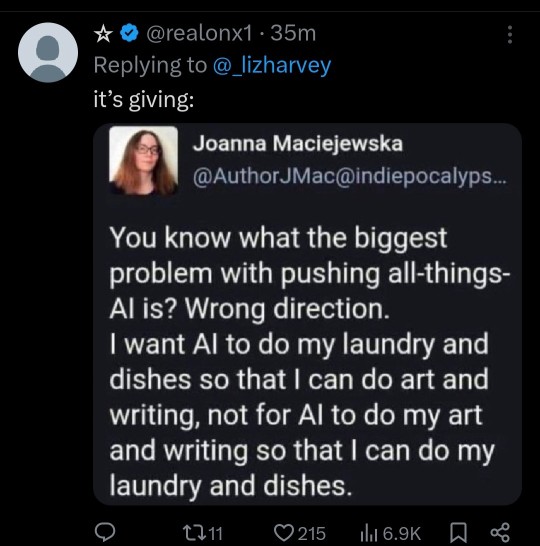
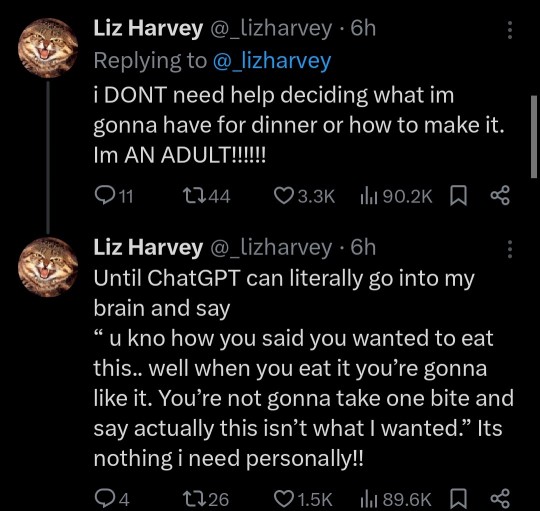
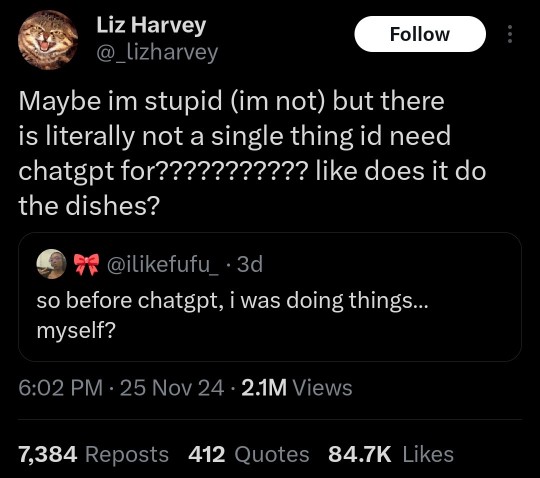
3K notes
·
View notes
Text
Try And Bye
You can’t blame a company for trying.
The history of business is chock full of examples of companies betting the farm. In a sea of uncertainty, it can become overwhelming wagering vast sums of money. It’s just that you have to wager something if you want to reap something.
There are winners, and there are losers, and it runs the gamut from small to large, new to old. Sometimes it happens to companies so successful that you wonder if they ever flub. Even companies like Amazon, who is shutting down a service feature it launched in the last decade.
Now lest you think the company is suddenly teetering, rest assured it’s just a blip on their annual report. Still, it shows that no one is immune to failure, even in e-commerce. As it turns out, not all facets of this gem are equally shiny.

In 2017 Amazon introduced Prime Wardrobe, a shopping service that allowed customers to select garments, shoes, and accessories, then try them out risk-free at home. Simply return what you don’t wish to keep. The name evolved until it reached the current moniker, Prime Try Before You Buy.
The primary driver in all of this was Amazon’s desire to challenge Stitch Fix, which had launched in 2011. Their $1.6 billion IPO in 2017 must have made Amazon extremely envious, and so they got to work with this project. Just like when an 800-pound gorilla enters the room, it sends a signal to everyone else there that resources might start to become scarce. At least that’s what Amazon was hoping.
Amazon, though, is in a bit of housecleaning mode these days. CEO Andy Jassy has been slashing costs since 2022, including the furlough of 27,000 employees. Jassy sees the product trial service as a cost center, and so it must go. Hey, if the only tool in the shed is a machete, then have at it. Worse yet, the concept was limited to wearables, only a small portion of Amazon’s merchandise array.
The more pressing question, though, is why was this service not popular for Amazon, but Stitch Fix is still going strong with their similar model? As it turns out, the answer may be pretty obvious.
On the surface, this should be an easy W for Amazon. While Stitch Fix has enjoyed a meteoric rise to success, and has a market cap of $597 million, it pales in size compared to Amazon with its $2.5 trillion market cap. This isn’t even a tale of David and Goliath. No, it’s a case of a lady bug up against a hippopotamus.
And yet Stitch Fix continues to do well. I suspect it has a lot to do with sticking to one’s knitting. Amazon, like many other larger-than-life companies, sees products and services as potential profit centers, and if management deems a particular item viable, then it gets added. If it is flopping, it will be cut. Pretty simple. Lather, rinse, repeat.
Then there’s the consideration of product quality and price. Amazon may be known for many things, but clothing is probably not one of them. A large portion of the clothing on Amazon is just fast fashion from Asia; Stitch Fix carries better brands at higher prices, and with a styling assistant to help tweak your wardrobe.Good luck competing against that, Amazon.
What we are seeing here is a smaller specialty firm with expertise and credibility going mano-a-mano with an impersonal mega-corporation. And sometimes, that lady bug can be a thorn in the flesh.
I cannot fault Amazon for trying, even if their motives were strikingly different from relatively tiny Stitch Fix. Taking chances is the only way to creating new wealth. This is not the only fail for Amazon. They have had quite a few flops in both products and services this century.
If anything, we must remember that this is how Jeff Bezos started Amazon in the 90s. He stood up to the Goliaths of the day, and carved out his empire. Now the tail has come around to slap the company on the back side.
I’m pretty sure the folks over at Stitch Fix are feeling pretty good these days.Dr “I Need To Look Into This” Gerlich
Audio Blog
0 notes